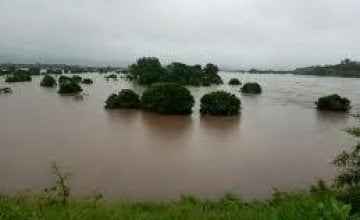
Read our 2024 annual report

Knowledge Hub
Impact of Cyclone Idai on the poorest in Malawi
In this brief, we examine the impact of the floods on some of the poorest people living in Mangochi and Nsanje; the extent of the damage caused to their households; and the warnings and type of assistance received. We also investigate differences in the impact of the floods on households enrolled on Concern’s Graduation programme.

Following a year of drought in 2018, the southern and central regions of Malawi experienced a tropical cyclone, Cyclone Idai, in March of 2019.
Our research shows that despite having greater losses, graduation households were more food secure than non-graduation households, providing preliminary evidence of a positive effect of the programme.
The research suggests the potential existence of an environmental poverty trap, where households are unable to move out of or fall back into poverty, as a result of weather shocks.
Findings:
The impact of the floods were widespread affecting 82% of households interviewed, with almost all (94%) in Nsanje and seven out of 10 in Mangochi affected. Most households were likely to face damage in more than one area, with over 62% affected in two or three different ways, underlining the multiple layers of impact a shock like this can have.
Financial losses were substantial; for non-graduation households the estimated damage to their homes and other damage and losses came to MWK 144,317 – for households included on the Graduation programme, this was higher at MK 189,035. Even though Graduation households had not yet received their capital transfer under the programme, there is evidence that they have been investing their monthly income support on a variety of productive and domestic assets, leaving them with a higher asset ownership and more to lose.
There were also significant impacts on households' food security observed; amongst non-graduation households, those affected by the flood were considered more food insecure, with graduation households being more food secure, irrespective of whether they were affected by the floods or not, providing preliminary evidence of a positive effect of the programme. Less than half (49.6%) of households across the two districts received some form of early warning. While the research did find some preliminary evidence of targeting, less than a quarter affected by the floods received any assistance.
Policy asks:
In terms of the way ahead, our early research results suggest the need for:
- A stronger and more timely Early Warning System that utilises media, such as the radio, that households can access. This EWS should engage village leaders and community structures more and should also be available in areas with less frequent flooding.
- Strengthened shock responsive social protection system that can be scaled up to reach all households affected by such a natural disaster that is based on need and level of loss, rather than access to other programmes.
- Where individual agencies continue to respond, their targeting criteria should be harmonised and focus on the most in need.
- The need to consider recovery efforts that support households to rebuild their livelihoods and food security through multiple means as floods affected households in a variety of different ways. At the same time, there is a need to ensure guidelines on building in flood plains are easily accessible and disseminated widely to reduce the impact of future floods.
- In terms of the research, we will continue to undertake further multivariate analysis (or multivariable regression analysis) to move beyond these preliminary findings and comprehensively examine the economic impacts of the flooding, and the gender dimensions of the impact of the flood.
While the research has been supported by the Irish Government all opinions expressed are those of the authors. The views expressed herein should not be taken, in any way, to reflect the official opinion of the Irish Government.




